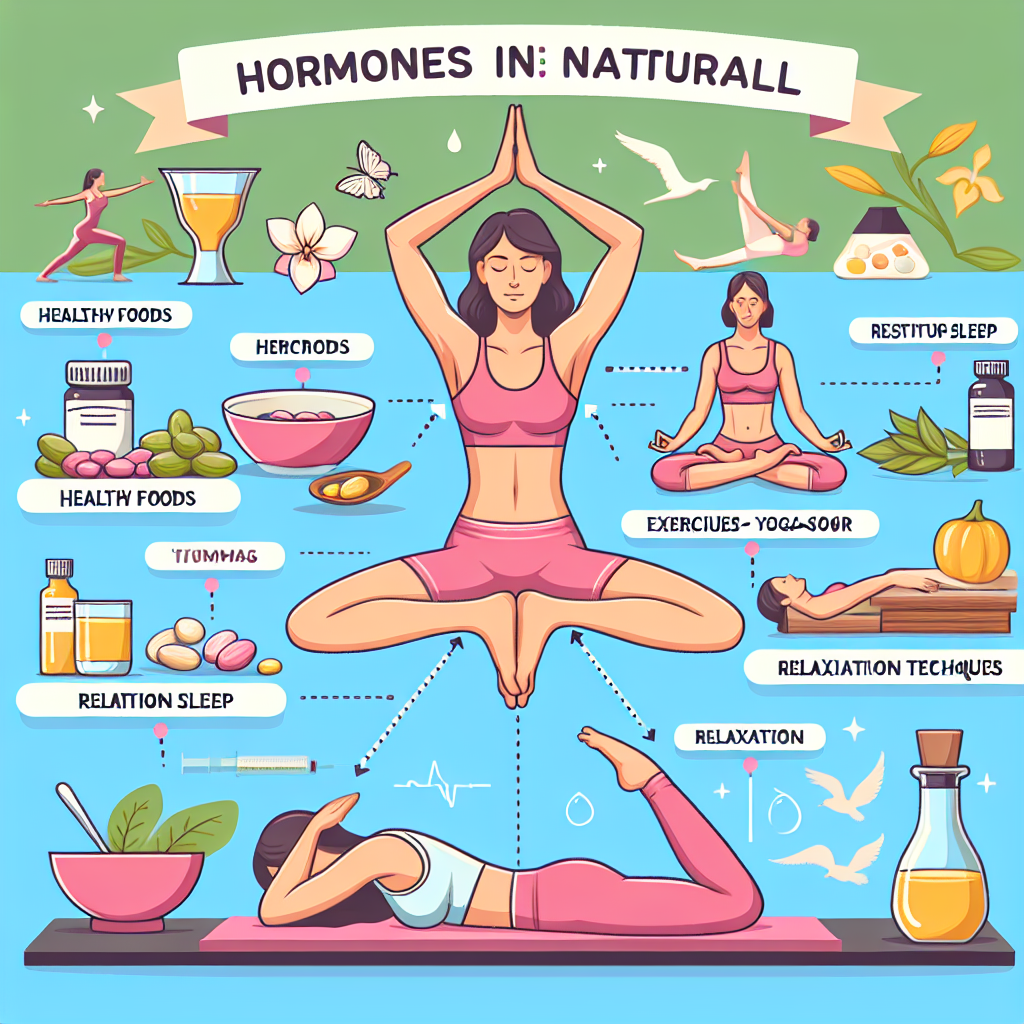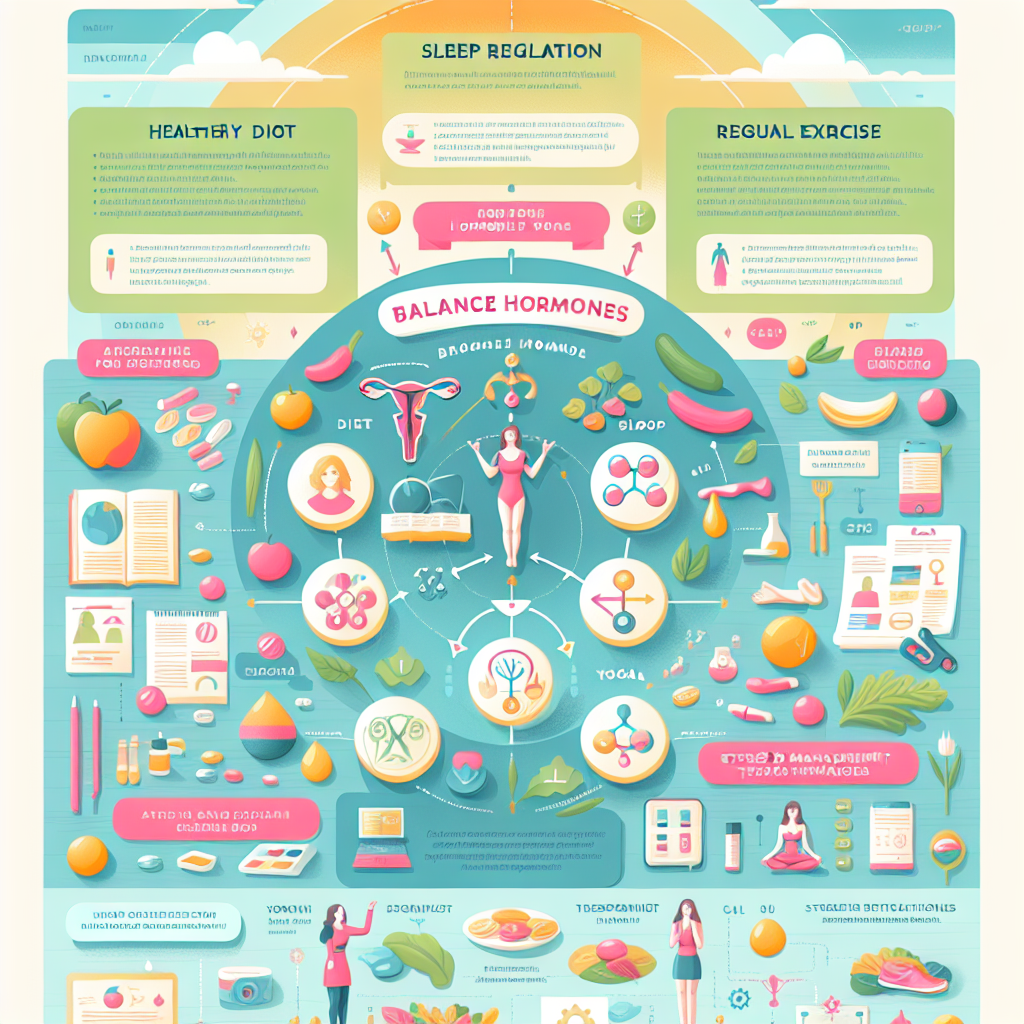How to Balance Hormones Naturally for Women

Discover how to balance your hormones naturally! Visit My Vibrant Vitality today and start your journey towards a healthier, more balanced life.
Exploring Natural Methods to Balance Women’s Hormones
Hormonal balance is a cornerstone of women’s health. It is a delicate equilibrium that can be easily disrupted by factors such as stress, poor diet, lack of exercise, and environmental toxins. When hormones are out of balance, it can lead to a variety of health issues, including mood swings, fatigue, weight gain, and even more serious conditions like infertility and certain types of cancer. Fortunately, there are natural methods that can help restore hormonal balance, promoting overall health and well-being.
Firstly, a healthy diet plays a crucial role in hormonal balance. Consuming a variety of nutrient-dense foods can provide the body with the essential vitamins and minerals it needs to produce hormones effectively. Foods rich in omega-3 fatty acids, such as fish and flaxseeds, can help regulate hormone production. Similarly, foods high in antioxidants, like fruits and vegetables, can protect the body from oxidative stress, which can disrupt hormonal balance. Additionally, limiting intake of processed foods and sugars, which can cause inflammation and hormonal imbalances, is also recommended.
Secondly, regular physical activity is another natural method to balance hormones. Exercise not only helps to maintain a healthy weight, but it also aids in regulating insulin levels, a hormone that plays a key role in metabolism. High-intensity interval training (HIIT) and strength training are particularly beneficial for hormone health, as they can help reduce insulin resistance and increase levels of hormones that help regulate appetite.
Thirdly, managing stress is essential for hormonal balance. Chronic stress can wreak havoc on hormones, leading to imbalances that can affect physical and mental health. Techniques such as meditation, yoga, and deep breathing exercises can help to reduce stress levels, promoting a more balanced hormonal state. Furthermore, getting adequate sleep is also crucial for hormone health. During sleep, the body works to repair and regenerate cells, a process that requires a delicate balance of hormones.
Fourthly, reducing exposure to endocrine-disrupting chemicals, which are found in many everyday products, can also help to balance hormones. These chemicals can mimic hormones in the body, leading to imbalances. Opting for natural, non-toxic products for personal care and household cleaning can help to reduce exposure to these harmful chemicals.
Lastly, certain herbs and supplements can also support hormonal balance. For instance, adaptogenic herbs like ashwagandha and holy basil can help the body adapt to stress, promoting hormonal balance. Additionally, supplements such as vitamin D, magnesium, and omega-3 fatty acids can support hormone health.
In conclusion, balancing hormones naturally involves a holistic approach that includes a healthy diet, regular exercise, stress management, reducing exposure to endocrine-disrupting chemicals, and the use of certain herbs and supplements. It’s important to remember that everyone’s body is unique, and what works for one person may not work for another. Therefore, it’s always a good idea to consult with a healthcare provider before starting any new health regimen. By taking proactive steps towards hormonal balance, women can improve their overall health and well-being.
The Role of Diet and Exercise in Balancing Women’s Hormones Naturally

Hormones are the body’s chemical messengers, playing a pivotal role in controlling our mood, metabolism, and overall health. For women, hormonal balance is particularly crucial, as it affects everything from menstrual cycles to fertility, weight, and mood. However, factors such as stress, poor diet, lack of exercise, and aging can disrupt this delicate balance, leading to a host of health issues. Fortunately, there are natural ways to balance hormones, with diet and exercise playing a significant role.
Firstly, let’s delve into the role of diet in balancing hormones. The food we consume has a direct impact on our hormonal health. Certain nutrients are essential for hormone production and function, and a deficiency in these can lead to imbalances. For instance, Omega-3 fatty acids, found in fatty fish, walnuts, and flaxseeds, are vital for the production of hormones. They also reduce inflammation, which can contribute to hormonal imbalances. Similarly, consuming a diet rich in fruits, vegetables, lean proteins, and whole grains can provide the body with the necessary vitamins and minerals for optimal hormonal health.
Moreover, certain foods can disrupt hormonal balance. Processed foods, high in sugar and unhealthy fats, can lead to insulin resistance, a condition where the body’s cells become less responsive to the hormone insulin. This can result in high blood sugar levels and an overproduction of insulin, leading to hormonal imbalances. Therefore, reducing the intake of processed foods and sugars can significantly improve hormonal health.
In addition to diet, exercise plays a crucial role in maintaining hormonal balance. Regular physical activity can help regulate insulin levels, reduce stress, and improve sleep – all of which are essential for hormonal health. Exercise stimulates the production of endorphins, the body’s natural mood elevators, which can help alleviate symptoms of hormonal imbalances such as mood swings and depression.
Strength training, in particular, can be beneficial for women’s hormonal health. It helps increase muscle mass, which in turn boosts metabolism and helps regulate insulin and other hormones. Moreover, strength training can increase levels of growth hormone and testosterone, both of which play a crucial role in women’s health and well-being.
However, it’s important to note that too much exercise can also disrupt hormonal balance. Over-exercising can lead to increased cortisol levels, the body’s stress hormone, which can interfere with other hormones. Therefore, it’s essential to find a balance and incorporate rest and recovery into your exercise routine.
In conclusion, diet and exercise play a significant role in balancing women’s hormones naturally. Consuming a nutrient-rich diet, reducing the intake of processed foods and sugars, and engaging in regular physical activity can help maintain hormonal balance and promote overall health. However, it’s important to remember that everyone’s body is different, and what works for one person may not work for another. Therefore, it’s always advisable to consult with a healthcare professional before making any significant changes to your diet or exercise routine. With the right approach, it’s entirely possible to balance hormones naturally and lead a healthier, happier life.
Understanding and Implementing Natural Remedies for Hormonal Balance in Women
Hormonal balance is a crucial aspect of a woman’s health, as hormones play a pivotal role in regulating various bodily functions, including mood, metabolism, and reproductive health. However, factors such as stress, poor diet, lack of exercise, and aging can disrupt this delicate balance, leading to a myriad of health issues such as weight gain, mood swings, fatigue, and menstrual irregularities. Fortunately, there are natural ways to restore hormonal balance, which can significantly improve overall health and well-being.
Firstly, it’s essential to understand that diet plays a significant role in hormonal balance. Consuming a diet rich in whole foods, lean proteins, fruits, vegetables, and healthy fats can provide the body with the necessary nutrients to produce and regulate hormones. In particular, foods high in omega-3 fatty acids, such as fish and flaxseeds, can help reduce inflammation and support hormonal balance. Additionally, limiting intake of processed foods, sugars, and caffeine can help prevent hormonal imbalances, as these can cause spikes and crashes in blood sugar levels, leading to hormonal fluctuations.
Secondly, regular physical activity is another natural way to balance hormones. Exercise not only helps maintain a healthy weight but also regulates insulin levels, reduces stress, and improves sleep – all of which are essential for hormonal balance. It’s recommended to engage in a mix of aerobic exercises, strength training, and flexibility exercises for optimal benefits.
Thirdly, stress management is crucial in maintaining hormonal balance. Chronic stress can wreak havoc on the endocrine system, leading to imbalances in cortisol, the body’s primary stress hormone. Techniques such as meditation, yoga, deep breathing, and other relaxation exercises can help manage stress levels and promote hormonal balance.
Moreover, getting adequate sleep is vital for hormonal balance. Lack of sleep can disrupt the body’s natural rhythm and lead to imbalances in hormones such as cortisol and melatonin. Therefore, it’s recommended to aim for seven to nine hours of quality sleep per night.
Lastly, certain natural supplements can also support hormonal balance. For instance, adaptogens such as ashwagandha and rhodiola can help the body adapt to stress and support adrenal health. Probiotics can improve gut health, which is closely linked to hormonal balance. However, it’s important to consult with a healthcare provider before starting any new supplement regimen.
In conclusion, balancing hormones naturally involves a holistic approach that includes a healthy diet, regular exercise, stress management, adequate sleep, and potentially the use of natural supplements. It’s important to remember that hormonal balance is not achieved overnight, but rather through consistent lifestyle changes over time. Furthermore, while these natural remedies can significantly improve hormonal balance, they are not a substitute for medical treatment. Therefore, if you’re experiencing severe symptoms of hormonal imbalance, it’s crucial to seek professional medical advice.
By understanding and implementing these natural remedies, women can take control of their hormonal health, leading to improved physical health, mental well-being, and overall quality of life.